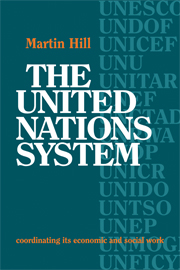Book contents
- Frontmatter
- Contents
- Foreword
- Preface
- Introduction
- Part I The problem of coordination and its setting
- 1 Relationship problems inherent in the decentralized United Nations System
- 2 Developments that have affected inter-agency relationships and coordination
- 3 The content of coordination activities
- 4 Intergovernmental organs responsible for coordination
- 5 The Administrative Committee on Coordination
- 6 The Secretary-General and the secretariats of the United Nations and the agencies
- 7 Some current constraints on order and coordination in the system
- Part II Some conclusions and suggestions
- Postscript
- 1 Abbreviations and glossary of institutions
- 2 Principal organs of the United Nations (General Assembly, Economic and Social Council and Secretariat) with main subsidiary organs directly concerned with economic and social cooperation and coordination (Status as of Spring 1976)
- 3 Chart of agencies related to the United Nations
- 4 Regional and branch offices of organizations of the United Nations System
- 5 Chart of the United Nations System
- 6 A new UN structure for global economic cooperation–list of conclusions and recommendations of the Group of Experts, prepared by the Secretariat
- Notes
- Index
2 - Developments that have affected inter-agency relationships and coordination
Published online by Cambridge University Press: 05 November 2011
- Frontmatter
- Contents
- Foreword
- Preface
- Introduction
- Part I The problem of coordination and its setting
- 1 Relationship problems inherent in the decentralized United Nations System
- 2 Developments that have affected inter-agency relationships and coordination
- 3 The content of coordination activities
- 4 Intergovernmental organs responsible for coordination
- 5 The Administrative Committee on Coordination
- 6 The Secretary-General and the secretariats of the United Nations and the agencies
- 7 Some current constraints on order and coordination in the system
- Part II Some conclusions and suggestions
- Postscript
- 1 Abbreviations and glossary of institutions
- 2 Principal organs of the United Nations (General Assembly, Economic and Social Council and Secretariat) with main subsidiary organs directly concerned with economic and social cooperation and coordination (Status as of Spring 1976)
- 3 Chart of agencies related to the United Nations
- 4 Regional and branch offices of organizations of the United Nations System
- 5 Chart of the United Nations System
- 6 A new UN structure for global economic cooperation–list of conclusions and recommendations of the Group of Experts, prepared by the Secretariat
- Notes
- Index
Summary
Increase in scope and interdependence of international activities
All the problems just discussed are still with us, but big changes in the context and dimensions of many of them have occurred since the general structure of international organization was determined in the 1940s. Of these changes, and their effects on the coordination issue, one may note, first, the vast increases in the scope of international economic and social activities since the mid-1940s, an increase that has naturally been accompanied by a constant broadening of the programmes and an ever-greater interdependence of the activities of different agencies. The task of the UN has been increasingly to promote and to help organize and guide the use of the skills and thinking of the agencies, and of its own subbodies and services, in the solution of world problems which straddle the competence of numerous national departments and international organizations. Except in a few cases, such as the campaign against illiteracy (UNESCO), and the World Employment Programme (the ILO), the broad inter-agency programmes–for example, the International Development Strategy, the World Plan of Action in the field of science and technology, the United Nations Environment Programme, community and rural development–have been led by the United Nations itself. Some of these programmes have underlined the problem, referred to in the last chapter, of reconciling the role of the Council as coordinator and initiator with its role as a governing body responsible for a sector of the United Nations System's substantive work and properly subject to coordination as much as any specialized agency.
- Type
- Chapter
- Information
- The United Nations SystemCoordinating its Economic and Social Work, pp. 24 - 42Publisher: Cambridge University PressPrint publication year: 1978



